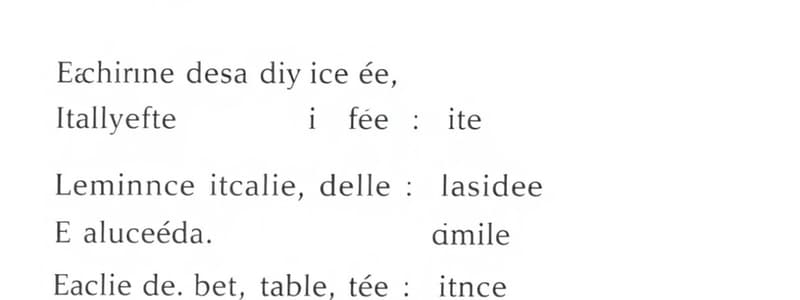Podcast
Questions and Answers
In which context would 'figurati' be used to express that something is not a problem and it is a pleasure?
In which context would 'figurati' be used to express that something is not a problem and it is a pleasure?
- When emphasizing a lack of time
- When someone expresses gratitude for your help (correct)
- When showing indifference to an invitation
- When denying a sarcastic remark
What is a common English equivalent for 'figurati' when someone says thank you?
What is a common English equivalent for 'figurati' when someone says thank you?
- Forget about it (correct)
- It's about time
- Of course not
- See you later
How would 'figurati' be expressed when responding sarcastically to a question?
How would 'figurati' be expressed when responding sarcastically to a question?
- What do you think? (correct)
- Sure, why not?
- It doesn’t matter
- You must be kidding!
Which phrase emphasizes that one has no time for an activity?
Which phrase emphasizes that one has no time for an activity?
What does 'figurati' translate to when someone says they have not been called by a friend?
What does 'figurati' translate to when someone says they have not been called by a friend?
Which English phrase suggests that helping someone was an obvious decision?
Which English phrase suggests that helping someone was an obvious decision?
When someone uses 'figurati' to emphasize a point, which option reflects this usage?
When someone uses 'figurati' to emphasize a point, which option reflects this usage?
In which scenario is 'figurati' used to underline an impossibility?
In which scenario is 'figurati' used to underline an impossibility?
Flashcards are hidden until you start studying
Study Notes
"Figurati" in English
- "Figurati" in Italian is similar to the English words "you're welcome" or "don't mention it"
- Many translations of "figurati" exist, and the best translation depends on the context
- When replying to someone and they thank you for your help (e.g. "Thank you for your help"), "figurati" means "You're welcome," and can be translated as:
- "You're welcome"
- "Don't mention it"
- "Anytime"
- "Forget about it" (very American)
- When replying to someone sarcastically (e.g., "James called you."), "figurati" means "Of course," and can be translated as:
- "Has James called you? What do you think?"
- "Of course not."
- When emphasizing a situation (e.g. "I don't have time to read the newspaper"), "figurati" means something like "let alone," and can be translated as:
- "I don't have time to read the newspaper, let alone a book."
- The key point is that "figurati" does not have one single translation in English and depends upon the context of the conversation.
Studying That Suits You
Use AI to generate personalized quizzes and flashcards to suit your learning preferences.

